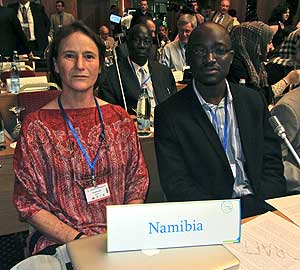![]() Tbilisi +35
Tbilisi +35
[The Namibian
-- 20 September 2012]
 Over
300 representatives from 104 countries including international intergovernmental
and non-governmental organizations in partnership with UNESCO and UNEP
met to develop and adopt a Tbilisi Communique: “Educate Today for
a Sustainable Future”. The meeting took place on the 6th and 7th
September 2012 in Tbilisi, Georgia. Representatives from Namibia included
Frans Kamenye from the Ministry of Environment and Tourism and Liz Komen
from NARREC.
Over
300 representatives from 104 countries including international intergovernmental
and non-governmental organizations in partnership with UNESCO and UNEP
met to develop and adopt a Tbilisi Communique: “Educate Today for
a Sustainable Future”. The meeting took place on the 6th and 7th
September 2012 in Tbilisi, Georgia. Representatives from Namibia included
Frans Kamenye from the Ministry of Environment and Tourism and Liz Komen
from NARREC.
The conference, Tbilisi +35, was called thirty five years after the Tbilisi Declaration was accepted at an intergovernmental meeting in 1977, as a first working policy document for Environmental Education (EE). During Tbilisi +35 the Tbilisi Declaration with its' well designed fundamental principles for EE was applauded as a precursor to the this second intergovernmental meeting in Tbilisi. Tbilisi +35, specifically addressed the current needs of environmental education to educating for a sustainable future. Particular importance was placed on a continuum that will be necessary after 2014 when the UN declared Decade of Education for Sustainable Development is concluded. This continuum has been stressed in an outcomes document from Tbilisi +35, the Tbilisi Communique, which will be delivered by UNESCO as a high-impact document in Japan 2014.
The intended outcomes of this intergovernmental meeting included:
-
Providing a platform for decision-makers to enhance international cooperation for a concerted action towards the sustainable future;
-
Acknowledging achievements of the global community in the implementation of Environmental Education (EE) and Education for Sustainable Development (ESD);
-
Addressing the need for a balanced approach between environmental conservation and development, as well as persisting and emerging challenges of sustainable development and education, including but not limited to poverty, unequal access to schooling, uneven distribution of resources and opportunities, increased pressure on the carrying capacity of ecosystems and climate change;
-
Developing recommendations in light of the developments particularly those resulting from the Rio+20 UN Conference on Sustainable Development.
-
Providing a platform for decision-makers to enhance international cooperation for a concerted action towards the sustainable future;
-
Acknowledging achievements of the global community in the implementation of Environmental Education (EE) and Education for Sustainable Development (ESD);
-
Addressing the need for a balanced approach between environmental conservation and development, as well as persisting and emerging challenges of sustainable development and education, including but not limited to poverty, unequal access to schooling, uneven distribution of resources and opportunities, increased pressure on the carrying capacity of ecosystems and climate change;
-
Developing recommendations in light of other developments particularly those resulting from the Rio+20 UN Conference on Sustainable Development.
From a number of country reports on current status concerning education for sustainable development and from excellent keynote addresses and panel discussions the issues that were continuously raised included the need for educator training and for new paradigms in education in order to strengthen values education across all sectors of life. The “green economy” concept was emphasised as essential to a sustainable future for our global community, and lifelong learning across formal, non-formal and informal education sectors was stressed as the vehicle to achieve “enough for all for ever”.
Namibia's
current position on education for a sustainable future has been described
in a “Draft Report on EE/ESD; Recommendations, Proposed Strategies,
and Capacity Needs for Namibia's EE/ESD Training Institutions” by
Alex Kanyimba and Loini Katoma. In this 2010 report the findings review
national documents and emphasize the need to use existing institutional
framework to mainstream EE/ESD programs in curriculum planning and national
development.
 Liz
Komen
Liz
Komen
NARREC